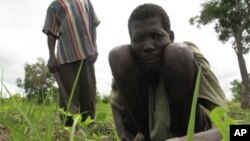UNITED NATIONS - A senior United Nations official says the Central African Republic continues to face challenges after years of political instability and armed conflict.
Margaret Vogt, the United Nations Special Representative for the Central African Republic, told the U.N. Security Council that the country is at a critical juncture, a phrase she admitted that she used last year when she delivered a similar report. She said it is essential that the Central African Republic, known as the CAR, continue building on the momentum recently created by the government in the areas of politics, security and what is known as DDR - the disarmament, demobilization and reintegration of former rebels.
“The dynamic of peace between the government and the politico-military groups and the dialogue called by the president offer a real chance for the stabilization of this beautiful country. The CAR populations sincerely hope they can count on the international community’s continued assistance and generosity to help bring about lasting peace in their
country through the completion of the DDR process.”
Vogt also pointed to an upsurge in human rights violations in the Central African Republic, including summary executions, torture, arbitrary arrests and detentions carried out by security and defense forces, particularly by some members of the Presidential Guards.
The Security Council, in a statement read after a closed-door meeting by its president, ambassador Li Baodong of China, expressed deep concern about those rights violations.
“They called upon the government to investigate these violations and bring those responsible to justice, and to insure full respect for the rule of law and human rights, including freedom of the press,” Li said.
The Security Council acknowledged efforts of the Central African Republic’s government to launch a political dialogue last month, but expressed concern over what it called the lack of consensus on the reform of the country’s electoral code. The council urged the government
to continue the dialogue in an inclusive manner, with the participation of the opposition.
The representative of the Central African Republic, Charles Armel Doubane, admitted in his remarks to the Security Council, that human rights and the rule of law are what he termed the Achille’s heel not only for his country but others as well. He spoke through a translator:
“Countries that are in a post-conflict situation cannot simply wave a magic wand and change mindsets. The government will continue with its reforms that are underway in order to establish a state which genuinely protects and defends human rights,” Doubane said.
Doubane said the government remains aware of what he called rogue agents of the law-and-order forces that sometimes in conflict areas violate the rights of the local populations.
Margaret Vogt, the United Nations Special Representative for the Central African Republic, told the U.N. Security Council that the country is at a critical juncture, a phrase she admitted that she used last year when she delivered a similar report. She said it is essential that the Central African Republic, known as the CAR, continue building on the momentum recently created by the government in the areas of politics, security and what is known as DDR - the disarmament, demobilization and reintegration of former rebels.
“The dynamic of peace between the government and the politico-military groups and the dialogue called by the president offer a real chance for the stabilization of this beautiful country. The CAR populations sincerely hope they can count on the international community’s continued assistance and generosity to help bring about lasting peace in their
country through the completion of the DDR process.”
Vogt also pointed to an upsurge in human rights violations in the Central African Republic, including summary executions, torture, arbitrary arrests and detentions carried out by security and defense forces, particularly by some members of the Presidential Guards.
The Security Council, in a statement read after a closed-door meeting by its president, ambassador Li Baodong of China, expressed deep concern about those rights violations.
“They called upon the government to investigate these violations and bring those responsible to justice, and to insure full respect for the rule of law and human rights, including freedom of the press,” Li said.
The Security Council acknowledged efforts of the Central African Republic’s government to launch a political dialogue last month, but expressed concern over what it called the lack of consensus on the reform of the country’s electoral code. The council urged the government
to continue the dialogue in an inclusive manner, with the participation of the opposition.
The representative of the Central African Republic, Charles Armel Doubane, admitted in his remarks to the Security Council, that human rights and the rule of law are what he termed the Achille’s heel not only for his country but others as well. He spoke through a translator:
“Countries that are in a post-conflict situation cannot simply wave a magic wand and change mindsets. The government will continue with its reforms that are underway in order to establish a state which genuinely protects and defends human rights,” Doubane said.
Doubane said the government remains aware of what he called rogue agents of the law-and-order forces that sometimes in conflict areas violate the rights of the local populations.




